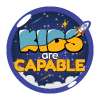Financial literacy is a crucial life skill that can significantly impact an individual’s future financial stability and decision-making. But when is the right time to start teaching children about money? And what are the foundational principles that should be introduced first?
The Right Age to Start Financial Education
Experts generally agree that financial education should begin as early as possible. Research from the University of Cambridge suggests that money habits in children are formed by the age of 7. This early start can help children develop a healthy relationship with money and understand basic financial concepts before they become financially independent.
Preschool and Early Elementary (Ages 3-7): At this age, children can grasp simple concepts like identifying coins and bills, understanding that money is used to buy things, and recognizing the difference between needs and wants. Parents can start with basic lessons, such as:
- Identifying Money: Introduce different coins and bills, and explain their value.
- Understanding Trade: Use play money in games to show how money is exchanged for goods and services.
- Saving vs. Spending: Use a clear jar to help them visualize saving money over time.
Middle to Late Elementary (Ages 8-12): As children grow, their understanding of money can become more sophisticated. At this stage, they can handle more complex concepts like budgeting and earning money. Important principles to introduce include:
- Allowance: Give a small, regular allowance to teach them about earning and managing money.
- Budgeting: Help them create a simple budget for their allowance, including categories for saving, spending, and giving.
- Delayed Gratification: Teach the importance of waiting to buy something until they have enough money saved.
Teenagers (Ages 13-18): During the teenage years, financial education should become more comprehensive, covering topics such as banking, credit, and long-term saving. Key principles include:
- Bank Accounts: Open a savings and checking account for them, and teach them how to manage it.
- Credit and Debt: Explain how credit cards work, the importance of paying off balances, and the dangers of debt.
- Investing: Introduce basic concepts of investing and the power of compound interest.
Important Principles to Introduce First
1. Needs vs. Wants: Understanding the difference between needs and wants is fundamental. Needs are essentials like food, shelter, and clothing, while wants are non-essential items like toys or entertainment.
2. Saving: Teach children the habit of saving a portion of their money. Use a savings jar or a bank account to make it tangible. Explain the concept of setting savings goals for larger purchases.
3. Budgeting: Even a simple budget helps children learn how to manage their money. Show them how to allocate their money for different purposes, including saving, spending, and donating.
4. Earning Money: Encourage children to earn their own money through chores, small jobs, or entrepreneurial activities. This helps them understand the value of money and the effort required to earn it.
5. Making Choices: Teach children that money is finite, and they must make choices on how to spend it. This can involve making trade-offs and prioritizing what is most important.
Noteworthy Sources for Further Reading
For those interested in diving deeper into the topic of children’s financial literacy, here are some excellent resources:
- The National Endowment for Financial Education (NEFE): NEFE offers a wealth of resources and research on financial education, including programs specifically for young people.
- Money as You Grow: A resource from the Consumer Financial Protection Bureau that provides age-appropriate financial lessons and activities for children.
- Junior Achievement: This organization provides programs to help students understand financial literacy, work readiness, and entrepreneurship.
- Practical Money Skills for Kids: Created by Visa, this site offers educational resources for children, parents, and teachers to help build strong financial habits.
Starting financial education early and building on it progressively can equip children with the skills they need to navigate the financial world confidently and responsibly. By introducing foundational principles like needs vs. wants, saving, budgeting, earning, and making choices, parents and educators can set children on a path to financial success.

